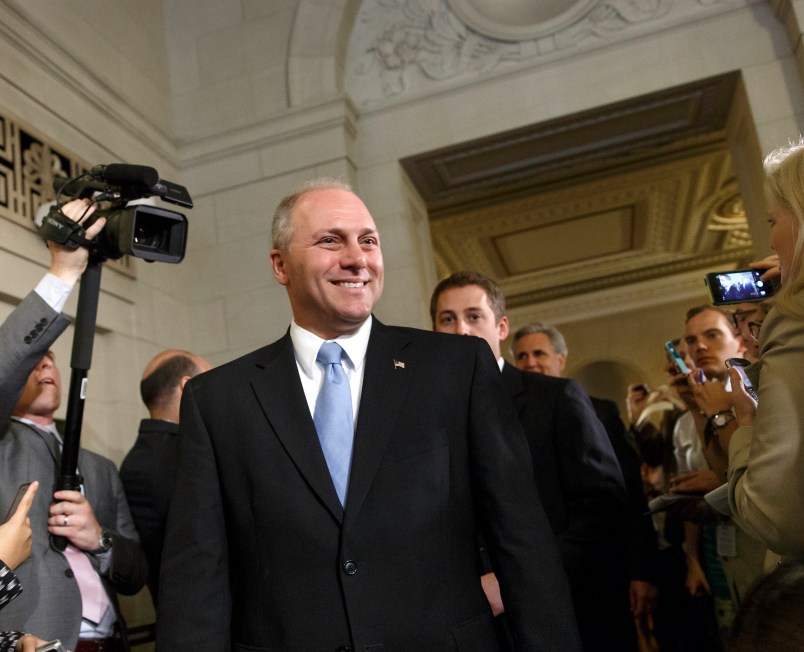The next third-ranking leader of the House Republican conference is a fierce conservative who has often voted against the initiatives of Speaker John Boehner and makes the existing leadership team look rather moderate by comparison.
Majority Whip-elect Steve Scalise was first elected to the House in a 2008 special election. He represents a deeply conservative district in southern Louisiana that was most recently represented by Bobby Jindal and David Vitter and hasn’t elected a Democrat since 1977.
A major issue in his successful campaign to replace Kevin McCarthy, who will succeed ousted Rep. Eric Cantor as majority leader, was that nobody in Republican leadership represented a red state. Currently each of the top four leaders hails from a state that elected Barack Obama twice (Ohio, Virginia, California and Washington). The restless South wanted to rise again.
According to the guardians of right-wing purity, Scalise’s voting record is one of the most conservative in Congress. Heritage Action ranks him in the top 10 percent — slightly less conservative than Rep. Michele Bachmann (R-MN) but more conservative than Rep. Steve King (R-IA). Club For Growth rates him as nearly as conservative as Rep. Steve Stockman (R-TX).
This could complicate matters for leadership. Unlike McCarthy, who typically supported Boehner and Cantor’s initiatives, Scalise has voted against many deals they’ve struck with Democrats to keep the federal government functioning — including the 2011 deal to slash spending and raise the debt limit, the 2013 bill to end the government shutdown and avert default, the budget accord struck by Rep. Paul Ryan (R-WI) and Sen. Patty Murray (D-WA) and the farm bill. The right deemed each of those bills insufficiently conservative, and Scalise agreed.
The job of the whip is to secure votes and unite the conference behind leadership. If Scalise changes his voting patterns he could become Boehner’s most effective liaison to the right flank. But if he doesn’t, he may give conservatives cover to oppose the Speaker’s initiatives.
“You’ve got to get people to make difficult decisions on things like the debt limit and how we’re going to keep the government open. So if you don’t have a history of voting for those things it’s going to be very difficult to convince yourself and others to do that,” Rep. Tom Rooney (R-FL), a deputy majority whip, said before Scalise was elected. “When you’re talking about the function of that job, there are a lot of things that we don’t want to be whipping but we have to. So when those days come, based on your voting history, how do you reverse gears?”
Scalise is also angling against a deal on immigration reform, which Boehner has said he wants to pass this year. The immigration section of Scalise’s web page vouches for sealing the border, declaring English as the official language of the United States, cutting off benefits for undocumented immigrants, ending birthright citizenship and blocking any kind of “amnesty.”
So far it’s not evident that these disagreements with leadership will be a big problem because Scalise, despite his voting record, hasn’t gone out of his way to undermine Boehner like some Republicans have. In fact his bid for whip secured the support of several top Boehner allies, including House Republican Conference Chair Cathy McMorris Rodgers (WA) and Rep. Tom Cole (OK), a deputy majority whip.
According to GovTrack.us, an independent website that tracks legislation, Scalise has introduced 40 bills during his six years in Congress on issues from economic deregulation to Iran sanctions. None of them have become law. One was a symbolic resolution, approved by the House in 2008, to express support for the designation of National D-Day Remembrance Day and honor the soldiers that fought in World War II.
Scalise is the current chair of the Republican Study Committee, a House hub for crafting very conservative policy ideas and steering the GOP conference to the right. His tenure has been less than smooth; interestingly, he has come under heavy criticism from the hard right for ostensibly being too cozy — and not confrontational enough — with GOP leadership. A flashpoint was his decision in December to fire longtime executive director Paul Teller, who was quickly snapped up by Sen. Ted Cruz (R-TX).
“Scalise may have an 81% Heritage Action scorecard, but he has turned the once much heralded Republican Study Committee into a toady group for House leadership,” conservative activist and Fox News contributor Erick Erickson wrote, in a blog post endorsing Scalise opponent Rep. Marlin Stutzman (R-IN) for whip.
In the end, the leadership elections Thursday were viewed as a sort of dress rehearsal for January, when the next Congress will be sworn in and Republicans will elect their leaders all over again. Members are spooked by Cantor’s shocking defeat and even more wary than usual of angering the anti-establishment right. The coming months will illuminate Scalise’s role in leadership and which direction he wants to take the party.







sh#t sandwich
“If Scalise changes his voting patterns he could become Boehner’s most effective liaison to the right flank.”
And if horses started growing beautiful ivory horns out of their foreheads, they will become unicorns. Both have about exactly the same probability of happening.
Boehner’s not going to have it any easier if he runs for Speaker again next year.
“Scalise may have an 81% Heritage Action scorecard, but he has turned the once much heralded Republican Study Committee into a toady group for House leadership,”
I sometimes wonder if republicans like Erickson turn their nose up at Ivory soap, too. “Nah, if it ain’t 100%, its useless”
Cue the live boy or dead prostitute in three…two…one…